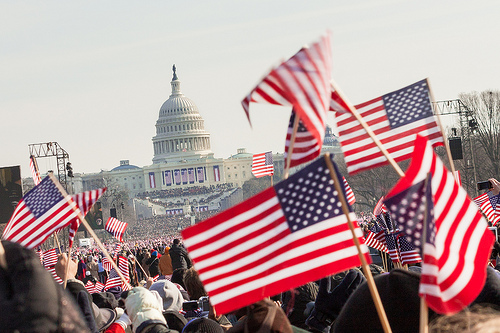Two days ago, the world watched the duel between Barack Obama and Mitt Romney. Who will win, people asked themselves? The “black Muslim Socialist,” as Obama was often decried by his adversaries, or the “white Mormon capitalist,” as Romney was often depicted by his detractors? Black vs. white? Modest origins vs. rich upbringing? Democrats vs. Republicans? Intellectual vs. popular education? Regardless of which side we were supporting, the two men represented the divide of a worn-out American society. They became, willingly or unwillingly, icons of their respective camps.
About a century and half after the end of the American civil war, the USA is divided as never before. By saying so I am not trying to raise the spectre of a new civil war. However, these recent elections showed to the world two distinct Americas: the old, rich, white, conservative America, and the young, poor, multiethnic, liberal America. And it is as if Hurricane Sandy wanted to prove the existence of this rift: the last few cosmetics that were covering the scars of America fell down. The hospitals that were out of hydro in the heart of New York, the long lines of people waiting for gas, the flooding of subway stations… classic pictures that used to inundate our TV screens from poor countries devastated by natural catastrophes are now a sad reality for many Americans.
But the decline of American democracy didn’t start with Hurricane Sandy or with election gaffes made by some aspiring politicians. When I hear of the astronomical $6 billion spent on this last U.S. election, I can’t stop thinking about how many hungry children this amount could have fed. How many water wells this amount could have dug in Africa. How many poor Americans this amount could have sent to college.
Democracy became a business with “shareholders,” “dividends” and “profits,” with powerful lobby groups collecting all the “dividends,” and the big fund purveyors of Wall Street and Hollywood acting as the actual shareholders. In his powerful book Democracy Incorporated, Sheldon Wolin presents a meticulous portrait of this new type of managed democracy that becomes so close to totalitarianism. Wolin’s theory isn’t extravagant or simply superfluous. After all, Barack Obama, despite all his promises and eloquent speeches, defended the Bush era by preserving all of its controversial policies: the Guantanamo detention camp is still open and last year Obama granted final immunity to CIA torturers. Glenn Greenwald, the author of many bestsellers including With Liberty and Justice for Some, wrote extensively about the two-tier legal system in the U.S. where the rich can get away skirting the law while the same law can be used to incarcerate thousands of ordinary and usually poor Americans.
When the economy is healthy, all social discrepancies and inequalities are smoothed with good salaries. Unfortunately, it is at times of financial distress like the ones we have been witnessing for the past two years that the cruel reality catches millions of Americans, especially those who have had a hard time paying their health-care bills and mortgages.
Can the declining American democracy reverse its fate and show us, we skeptical observers, that it can still produce miracles? I highly doubt it. Even Wall Street’s boys seem to doubt this rebound. A day after Obama’s victory, the capital markets opened with some grim perspectives for the short-term horizon. The divide inside America goes beyond the deeply reflected shadows in Washington. With a Democrat president and a majority of Republican senators, the economy can’t budge. The upcoming “fiscal cliff,” translated with high taxes and low spending cuts, can be potentially fatal not only for America but also for one of its closest economic partners, the northern neighbour that Americans call Canada.
Photo: ep_jhu/Flickr
Monia Mazigh was born and raised in Tunisia and immigrated to Canada in 1991. Mazigh was catapulted onto the public stage in 2002 when her husband, Maher Arar, was deported to Syria where he was tortured and held without charge for over a year. She campaigned tirelessly for his release. Mazigh holds a PhD in finance from McGill University. In 2008, she published a memoir, Hope and Despair, about her pursuit of justice, and in 2011, a novel in French, Miroirs et mirages.




